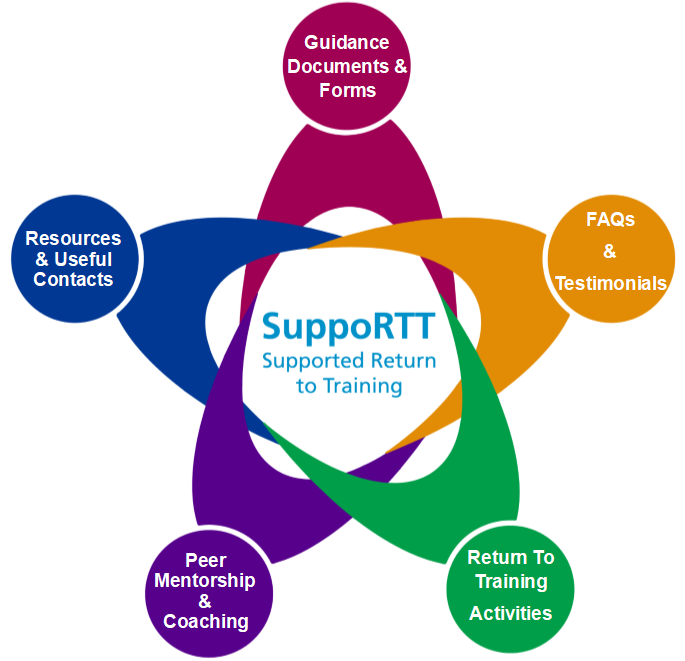
Flexible Training Pathways
Both Health Education England Yorkshire & Humber and the School of Ophthalmology aim to support trainees from a variety of backgrounds, social and family circumstances to developing their careers in ophthalmology and follow specialist interests.
Out-of-programme activities allow trainees to take time out to pursue other educational activities and experiences, or to take a career break. Returning to training following time away is assisted by the SuppoRTT (Supported Return To Training) programme. Less-than-full-time (LTFT) training allows flexibility if training full-time is not desirable or possible.
The links below have more information about flexible training options and how to apply for these. More information on policies and the application process can be found in the documents section at the bottom of this page.
Taking Time out of programme (OOP) can be beneficial to a trainees' educational and professional development. There are different types of OOP and not all count towards training:
1) Out of programme experience for training (OOPT): This requires approval by the GMC and this will count towards your CCT.
2) Out of programme experience for clinical experience (OOPE): This does not require GMC approval and time spent in this OOP will not count towards your CCT.
3) Out of programme experience for research (OOPR): This OOP can be for up to 3 years and can lead to achieving a higher degree qualification.
4) Out of programme for a career break (OOPC): This is time away from training to pursue other non-training interest such as work in industry, to take care of domestic responsibilities or for ill health reasons.
5) Out of programme - Pause (OOPP): This is a new opportunity (of up to 1 year's duration) for trainees to stop the clock on their training and undertake an NHS non-training post, gain further experience, take stock of their training, work in another related specialty, or concentrate on their wellbeing. Further information on the application process can be found here.
OOP is encouraged by the School of Ophthalmology and can enrich the training experience. Typical OOP activities include clinical placements within the UK and overseas, leadership fellowships, educational roles and humanitarian work. Trainees have also taken OOPR to undertake research work and pursue postgraduate degrees such as MDs and PhDs. Be aware that with the exception of OOPT, other OOP activity will not count towards training time and will therefore lead to your CCT date being deferred. If you are thinking of applying for OOP activity it is important to think ahead and discuss your plans with your educational supervisor and training programme director early on.
It is recommended you start the application at least 6 months in advance. OOP for training (OOPT) and research (OOPR) need approval by HEYH (TPD and Postgraduate Dean approval) and RCOphth before then getting approval from the GMC. Approval from RCOphth must be done prospectively and a minimum time of 3 months should be allowed for the college to consider applications. GMC approval must also be prospective.
You should inform the college if you take OOP for experience (OOPE) or career break (OOPC) so that your e-portfolio and new CCT date can be updated.
Further guidance and HEE YH application forms are in the documents section below
Visit the college page for more information on applying for OOP and relevant forms to apply for college approval.
|
SuppoRTT Supported Return to Training Supported Return to Training (SuppoRTT) is a centrally funded Health Education England (HEE) programme which aims to support ALL trainees to safely and confidently return to training after a sustained period of absence. |

The programme applies to ALL trainees who are absent for a period of three months or more, regardless of the reason. Those who are absent for a shorter period may also access support.
As returning trainees are a diverse group, SuppoRTT aims to provide a bespoke, individualised package for each returning trainee, rather than a single ‘one size fits all’ approach. The SuppoRTT programme consists of;
- A structured and systematic process for planning absence, maintaining contact whilst out and planning for your return
- A menu of supported Return To Training Activities (RTT-A) that can be built into an individualised return-to-training package
- Funding to support CPD activities and a supernumerary period dependent on the trainees individual needs
We understand that returning to training after a period of absence can impact your clinical skills and confidence; however, you are not on your own! HEE and your School are here to support and guide you through this process. You just need to ask.
If you have any questions or queries please do not hesitate to contact the SuppoRTT team, via email at supportt.yh@hee.nhs.uk.
The SuppoRTT run a number of generic and speciality specific programme to help trainees prepare for returning to work. Many trusts across the deanery have a SuppoRTT champion who can help with queries directly related to the trust. There is more information on the deanery's SuppoRTT page.
2021 Update: Additionally, we are developing specific guidance for Ophthalmology trainees returning from time out, to be followed in conjunction with the SuppoRRT programme and resources.
Less than full-time training (LTFT is available for trainees who have “well-founded” reasons why they are unable to work full-time. LTFT training scheme is useful for trainees who need support balancing work and personal lives and for trainees who have health issues or disability that may be impacted by full-time training. All trainees are eligible to apply for LTFT, but they must be able to demonstrate well-founded reasons why full-time training is not desirable. There are two eligibility categories
Category 1: Trainees with
- Disability or ill health (this may include ongoing medical procedures such as fertility treatment);
- Responsibility for caring (men or women) for children;
- Responsibility for caring for ill/disabled partner, relative or other dependants
Category 2: Trainees with
- Unique opportunities for their own personal/professional development (example training for national/international sporting events)
- Short term extraordinary responsibility (for example a national committee)
- Religious commitment – involving training for a particular religious role which requires a specific amount of time commitment
- Non-medical professional development such as management courses, law courses, fine arts courses or diploma in complementary therapies.
The GMC recommends no less than 50% LTFT, except under exceptional circumstances. The RCOpth recommends LTFT should be 60% or greater to allow for progression and development of surgical skills. The GMC has a statement on LTFT which can be found here and RCOphth LTFT guidance can be found here.
If you are thinking of LTFT training, you should speak to your educational supervisor and Training programme director in the first instance. Read the LTFT policy which can be found in the documents section at the bottom of the page. This has detailed information about LTFT training and how to apply.
HEE YH LTFT information page can be found here.
Parental leave includes maternity, paternity and adoption leave. Trainees need to apply to their employing trust for parental leave. Each trust will have a parental leave policy and you should contact the HR department in your employer trust for more details.
Trainees on maternity leave may attend up to 10 keeping in touch days without bringing their maternity leave to an end. There is a similar arrangement available for trainees on Shared Parental Leave (SPLiT days). This allows the trainee an opportunity to reintegrate themselves into work, prior to their full time return. The trainee will be paid their basic daily rate for the hours worked, less appropriate maternity leave payment, for those days.
If you are interested in attending Keeping In Touch days, please speak to your your employing Trust and liaise with your department to arrange what you plan to do on these days.
HEE guidance on on KiT and SPLiT days can be found here. Information from NHS Employers can be found here.
HEE parental leave guidance can be found in the documents section at the bottom of the page.
Training less-than-full time, or taking time out of training for OOP activity, parental leave, or personal reasons will affect your training completion date.
The Joint Royal Colleges of Physicians Training Board (JRCPTB) has developed a calculator tool to assist with calculating completion dates.
The Royal College of Ophthalmologists portfolio team will not calculate your CCT date, but suggests that all trainees going out of programme for any reason, or changing their training to less-than-full-time, use the JRCPTB tool.
Once completed, the calculator should be forwarded to the relevant LETB/Deanery and TPD for approval and final confirmation. The calculated CCT date is provisional and subject to revision at ARCP. You must also update the RCOphth portfolio team (portfolio@rcophth.ac.uk) with the calculated date, so that it is included on your e-portfolio.
The CCT calculator can be found in the Documents section below, as well as an illustrated guide by one of our trainees.